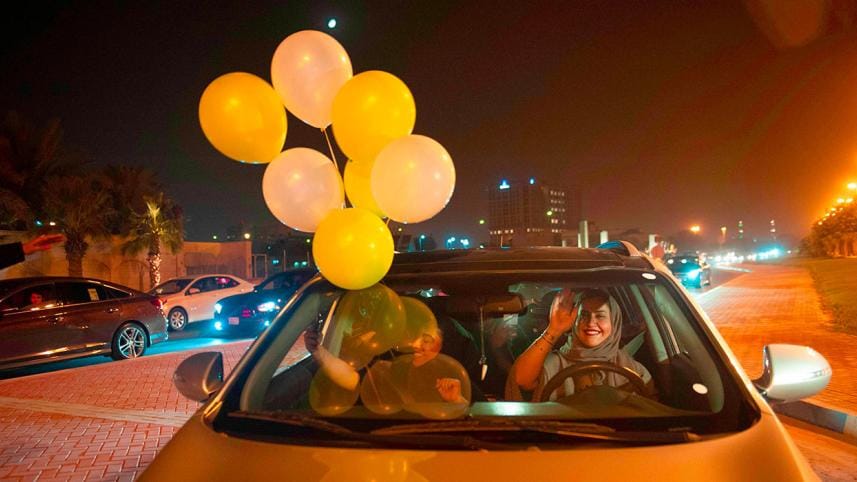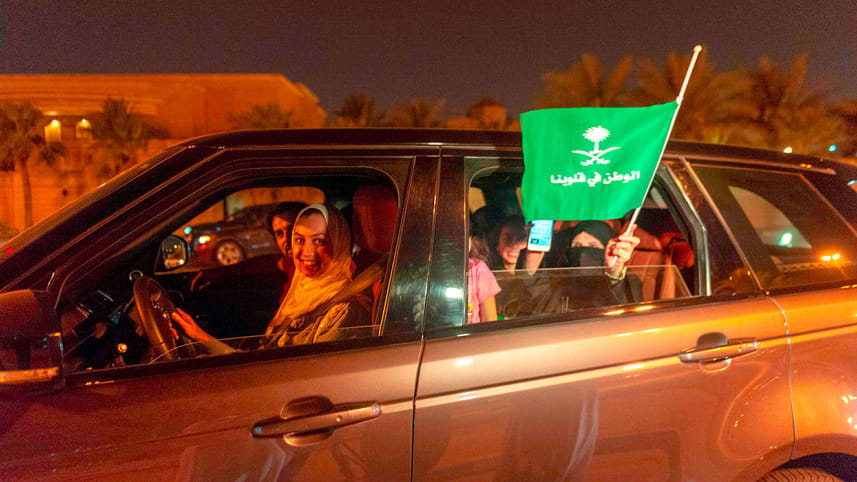Saudi women celebrate uplifting of driving ban

Saudi Arabian women celebrated being able to drive for the first time in decades today, as the kingdom overturned the world's only ban on female motorists, a historic reform expected to usher in a new era of social mobility.
The move is part of Crown Prince Mohammed bin Salman's wide-ranging drive to modernise the conservative petrostate -- but it has coincided with a sweeping crackdown on female activists who long opposed the driving ban.
Women in Riyadh and other cities began zipping around streets bathed in amber light soon after the ban was lifted at midnight, with some blasting music from behind the wheel.
"I always knew this day would come. But it came fast. Sudden," said talk show host and writer Samar Almogren as she drove across the capital. "I feel free like a bird."

Television presenter Sabika al-Dosari said the end of the ban was "a historic moment for every Saudi woman" before driving a sedan across the border to the kingdom of Bahrain.
The lifting of the ban, a glaring symbol of repression, is expected to be transformative for many women, freeing them from dependence on private chauffeurs or male relatives.
Euphoria was mixed with disbelief as women across the kingdom flooded social media with photos and videos of their maiden car rides, with a heavy police presence in major cities.
"This is a great achievement," billionaire Saudi Prince Al-Waleed bin Talal said as his daughter Reem drove a family SUV, with his granddaughters applauding from the back seat.
"Now women have their freedom," he added in a video posted on Twitter.
Some three million women in Saudi Arabia could receive licences and actively begin driving by 2020, according to consultancy firm PricewaterhouseCoopers.
The kingdom earlier this month began issuing its first driving licences to women in decades, with some swapping their foreign permits for Saudi ones after a practical test.
A handful of female driving schools have cropped up in several cities, training women to drive cars as well as Harley Davidson motorbikes -- scenes unimaginable even a year ago.
'Be gentle to women'
Many Saudi women have ebulliently declared plans online to drive for coffee or ice cream, a mundane experience elsewhere in the world but a dazzling novelty in the desert kingdom.
However, in a nation torn between modernity and tradition, many are also cautiously bracing for a backlash from arch-conservatives who spent decades preaching that allowing female motorists would promote promiscuity and sin.
Saudi society has been dominated by Wahhabism, a harsh strain of conservative Islam, since the 1979 seizure of the Grand Mosque of Mecca by around 400 extremists.
The decision to lift the ban was catalysed in large measure by what experts characterise as economic pain in the kingdom owing to a protracted oil slump.
The move is expected to boost women's employment, and according to a Bloomberg estimate, add $90 billion to economic output by 2030.
Many women fear they are still easy prey for conservatives in a nation where male "guardians" -- their fathers, husbands or other relatives -- can exercise arbitrary authority to make decisions on their behalf.
The government has preemptively addressed concerns of abuse by outlawing sexual harassment, and authorities have sternly warned against stalking women drivers.
"To all men I say, be gentle towards women" drivers, popular Saudi singer Mohammed Abdu said in an online video.
Prince Mohammed, appointed heir to the most powerful throne in the Middle East a year ago this month, has also lifted a ban on cinemas and mixed-gender concerts, following his public vow to return the kingdom to moderate Islam.
But much of the initial optimism over his reforms appears to have been dented by a major crackdown on women driving activists.
'Unrelenting crackdown'
Authorities have said nine of 17 arrested people remain behind bars, accused of undermining security and aiding enemies of the state.
The detainees include 28-year-old Loujain al-Hathloul -- also held in 2014 for more than 70 days for attempting to drive from neighbouring United Arab Emirates to Saudi Arabia -- and Aziza al-Yousef, a retired professor at Riyadh's King Saud University.
State-backed newspapers have published front-page pictures of some of the activists with the word "traitor" stamped across them in red.
Human Rights Watch last week said the kingdom has arrested two more female activists and many others have been barred from travelling outside the kingdom, in what it denounced as an "unrelenting crackdown".
Even some of the crown prince's ardent supporters have labelled the crackdown a "mistake".
It has been seen as a calculated move both to placate clerics incensed by his modernisation drive and also to send a clear signal to activists that the prince alone is the arbiter of change.
"If the authorities give credit to the women who championed lifting the driving ban, it means conceding that reforms can be won through activism, and then the Saudis may demand more," said HRW researcher Rothna Begum.



 For all latest news, follow The Daily Star's Google News channel.
For all latest news, follow The Daily Star's Google News channel.
Comments